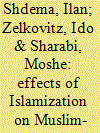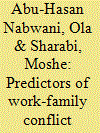|
|
|
Sort Order |
|
|
|
Items / Page
|
|
|
|
|
|
|
| Srl | Item |
| 1 |
ID:
174576


|
|
|
|
|
| Summary/Abstract |
This article compares the amount of land designated for various uses in the Jewish and Arab municipalities in Israel between the years 2003–13. It is generally accepted that the Arab-Jewish conflict in Israel is heavily based on land ownership. This conflict still has implications for the policies and actions of the State of Israel on the one hand, and the attitudes and behaviours of the Arab population on the other. Two main conclusions emerge from this article. The first is that in 2013, the area per capita used for residential living in Arab localities was larger, presumably because of the lack of high-rise buildings. The second conclusion is that the areas designated for economic and public purposes in the Arab sector are much smaller. The Israeli government should therefore allocate additional government land to the Arab local authorities.
|
|
|
|
|
|
|
|
|
|
|
|
|
|
|
|
| 2 |
ID:
183993


|
|
|
|
|
| Summary/Abstract |
This article examines the effects of Islamisation processes among Israeli Muslim Arabs on their intercommunal relations with Christian Arabs before and after the ‘Arab Spring’, based on 45 in-depth interviews held prior to and after this momentous event. The findings show the complex role played by Islamisation in Muslim-Christian relations, causing tensions and distancing at times while promoting intercommunal cooperation on other instances. They also reveal that in addition to the Islamic Movement, three other main socio-religious subsets played a role in Islamisation: secular, traditional and Salafi. Finally, since the onset of the ‘Arab Spring’, the religious identity of Israeli Muslims has remained central but the power of Islamic segments seems to have declined. Under these circumstances, Muslims and Christians tended to grow socially distant from each other, though no substantial tensions were evident.
|
|
|
|
|
|
|
|
|
|
|
|
|
|
|
|
| 3 |
ID:
170706


|
|
|
|
|
| Summary/Abstract |
his cross-sectional study examines changes in the importance of the valued work outcomes among Israeli men and women aged 25 years and over. Overall, gender differences have been declining over the years. Moreover, among both women and men there was decrease in the importance of the intrinsic outcome of interest and the social outcome of serving society at the expense of the dramatic increase in the importance of the extrinsic outcome of income. These trends reflect a continuing transformation from a more collectivist and altruistic society to a more individualistic and materialistic society.
|
|
|
|
|
|
|
|
|
|
|
|
|
|
|
|
| 4 |
ID:
178316


|
|
|
|
|
| Summary/Abstract |
Social Work as a profession plays a fundamental role in the development of the state, especially in assisting the most vulnerable parts of the population by way of contributing to the building of a fairer society and collective solidarity. Social work in Israel finds its professional space in several diverse fields with social work professionals using a wide variety of methodologies with individuals, groups and communities. This article discusses the evolution of the social work profession since Israel’s establishment in 1948, the welfare perspective that evolved over the years, and the vicissitudes in its underlying social values and ethical codes.
|
|
|
|
|
|
|
|
|
|
|
|
|
|
|
|
| 5 |
ID:
135780


|
|
|
|
|
| Summary/Abstract |
Work values among Jews in Israel have been studied for several decades, while there has been no attempt to study work values among Arabs. This article examines and compares the centrality of work and the preferred work goals among Israeli Jews and Arabs and the effect of demographic factors on work values. In 2006 the Meaning-of-Working (MOW) questionnaire was conducted on a representative sample of the Israeli labour force that included Jews and Arabs. The findings reveal significant differences regarding the importance of work and most of the preferred work goals among Jews and Arabs. Overall, the demographic variables hardly explain the value differences among members of the two ethnic groups. The findings can be explained by cultural, social and economic factors and primarily by the Israeli–Arab/Palestinian conflict.
|
|
|
|
|
|
|
|
|
|
|
|
|
|
|
|
| 6 |
ID:
189416


|
|
|
|
|
| Summary/Abstract |
This article compares work-family conflict (WFC) among more than 2000 married Israeli Jewish and Arab women. The data was taken from Israel Social Surveys and included varied life-course variables that allowed to explore in depth relationships between WFC and family formation. Our findings reveal that Arab women experienced WFC more than Jewish women. Delaying first marriage and first birth and having more children are related to higher WFC. Furthermore, WFC was associated positively with women’s wage and work experience. The implications of the research and recommendations for public policymakers are discussed.
|
|
|
|
|
|
|
|
|
|
|
|
|
|
|
|
| 7 |
ID:
181228


|
|
|
|
|
| Summary/Abstract |
Using the Mincer equation and the Oaxaca decomposition, this article examines what part of the gender wage gap in Israel during the years 2005–16 can be explained by differences in demographic attributes and preferences of men and women and what part cannot be explained by these variables, hence indicates gender discrimination. Findings show that during the examined period, there was no systematic change in the unexplained wage gap. However, in the years 2017–18, the unexplained wage gap between men and women began to decrease.
|
|
|
|
|
|
|
|
|
|
|
|
|
|
|
|
|
|
|
|
|